初中英语时态综合复习讲练(包含答案)
牛津上海版8A语法时态综合讲解及练习(有答案)

语法:时态语态综合初中阶段考查8种时态,分别是一般现在时、一般过去时、一般将来时、现在进行时、过去进行时、现在完成时、过去完成时和过去将来时。
今天我们涉及6个时态,分别是一般现在时、一般过去时、一般将来时、现在进行时、过去进行时和现在完成时。
英语的语态分为主动语态和被动语态,主动语态表示主语是动作的执行者。
被动语态表示主语是动作的承受者,目前中考主要考查一般现在时、一般过去时、一般将来时和现在完成时这四种时态的被动语态以及含情态动词的被动语态。
只有及物动词才有被动语态。
它的基本结构为:be动词+及物动词的过去分词。
所有的时态变化在be动词上。
动词时态:动词语态注意以下几种被动语态的特殊情况:一.被动语态中不定式要还原Let/make/see/hear/watch sb. do sth.----- sb. be let/made/seen/heard/watched to do sth.My mother made me look after the little sister yesterday.----I was made to look after the little sister by my mother yesterday.二.有些动词没有被动语态。
(及物动词才有被动语态)1) 不及物动词或动词短语无被动语态:appear, die,disappear, end (vi. 结束), fail, happen, last, lie, remain, sit, spread, stand break out, come true, fall asleep, keep silence, lose heart, take place.2) 系动词无被动语态:appear, be,become, fall, feel, get, grow, keep, look, remain, seem, smell, sound, stay, taste, turn3) 不能用于被动语态的及物动词或动词短语:fit, have, hold, marry, own, wish, cost, notice, watch,agree with, arrive at / in, shake hands with, succeed in, suffer from, happen to, take part in, walk into, belong to4) 系动词无被动语态:appear, be,become, fall, feel, get, grow, keep, look, remain, seem, smell, sound, stay, taste, turn5) 当宾语是不定式时,很少用于被动语态。
初中英语五个时态专题练习和答案(复习可用)
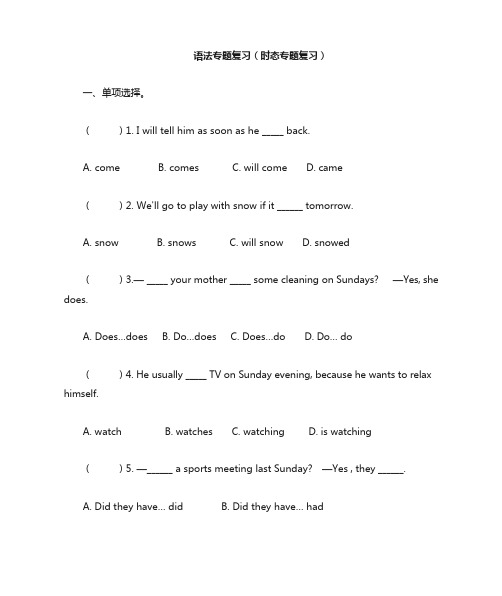
A. snow
B. snows
C. will snow D. snowed
( does.
)3.— _____ your mother _____ some cleaning on Sundays? —Yes, she
A. Does…does B. Do…does C. Does…do D. Do… do
( )11. You _____ me waiting for two hours. I _____ for you since five.
A. kept…waited
B. have kept…waited
C. kept…have waited D. have kept…have waited
( )12. —Where _____John _____?
6. We_________ (have) a good time in the Summer Palace last Sunday.
7. If it _________________ (not rain) tomorrow, we'll have a football match.
8. Don't forget _____________ (close) the window when you leave the room.
A. got to
B. reached C. arrive in D. reach
( )10. She ______ to school yesterday because of the strong wind and heavy rain.
A. goes B. went C. doesn’t go D. didn’t go
初中英语时态综合练习(附带答案)

英语综合时态练习一.各种时态下的动词形式1.一般现在时:2.一般过去时:3.一般将来时:4.现在进行时:5.过去进行时:6.现在完成时:7.过去完成时:8.过去将来时:二.单选1 .My sister _____ the Youth League last year. She _____ a Youth League member for about a year now.A.joined…has becomeB. joined…has beenC. has joined…has beenD. did join…had been2. I’ll talk to him when he ______.A. comeB. will comeC. comesD. came3. They _____ supper when we _____ into the room.A. are having…wentB. were having…goC. were having…wentD. are having…go4. We’ll go climbing if it _____ tomorrow.A. won’t rainB. did rainC. isn’t rainD. doesn’t rain5. I don’t know if it _____ tomorrow.A. will rainB. rainsC. rainedD. is rain6. Most people ____ TV.A. enjoy to watchB. enjoy watchC. enjoy watchingD. enjoys watching7. Father ____ his cap and went out.A. put onB. puts onC. had putD. will put on8. How long _____ your uncle ____ in the army ?A. has…joinedB. has…beenC. does…joinD. had…joined9. Peter _____ the work in a week.A. have finishedB. finishesC. is finishingD. will finish10. The students _____ the History Museum if it _____ fine tomorrow.A. will visit….isB. will visit…will beC. would visit …wasD. would visit…would be11. Joan ____ me whether I _____ the book before.A. asked…had readB. asked…shall readC. asked…would readD. asked…has read12._____ she _____ her lessons at seven yesterday evening ?A. Was…going overB. Is…go overC. Has…gone overD. Will…go over13. He can’t go to the cinema with me because he ____ a meeting at the moment.A. was havingB. would haveC. is havingD. had14. Both of the two dictionaries ____ very useful.A. areB. isC. wasD. am15. He _____ to me since last month.A. didn’t writeB. hadn’t writtenC. hasn’t writtenD. won’t write16. Xu Ping ____ to Japan only once.A. has goneB. had goneC. had beenD. has been17. Nobody ____ the answer.A. have knownB. knewC. didn’t knowD. are knowing18.______ you ever ____ to Nanjing ?A. Have…goneB. Have…beenC. Do…goD. Will …go19. He ____ he ____ something wrong before.A. says…wasB. say….have doneC. said…had doneD. said…would do20. He ____ me he ____ an interesting book.A. tell…would borrowB. told …will borrowC. tell…will borrowD. told …had borrowed21. Thomas Edison ____ already ____ a chemistry lab for himself by the time he ____ ten.A. has…built…wasB. had…built…wasC. would…build…wasD. was…building…is22. At the age of eleven, my grandfather _____ to work in a factory.A. beganB. has begunC. will beginD. begins23. One day while I ____ along the street, I ____ someone calling.A. walked…was hearingB. was walking…had heardC. was walking…heard24. Neither I nor he _____.A. can swims wellB. are swimming wellC. swims wellD. have swum well25. ____ you ____ where your sister has gone ?A. Did …knowB. Will…knowC. Are…knowD. Do …know26. Betty ____ morning exercises yesterday.A. not didB. don't doC. didn’t doD. won’t do27. The door of her room _____ every day.A. cleansB. are cleanedC. cleanedD. is cleaned28. No rubbish ____ for three weeks.A. collectedB. is collectedC. has collectedD. has been collected29. Another railway bridge ____ there now.A. is buildingB. is being builtC. is builtD. has been built30. ____ this film ____ last week ?A. Did…showB. Has…been shownC. Was…shownD. Was…be shown31. He told me that the composition ____ by him.A. was not writtenB. not was writtenC. is not writtenD. not is written32._____ the play ____ again next week?A. Will…put onB. Is…put onC. Will be…put onD. Will…be put on33. She ____ to a hospital at once.A. must sendB. must be sentC. must to be sentD. had to send34. Mike usually ____ up at six in the morning.A. getB. getsC. gotD. will get35. The sun _____ us light and heat.A. giveB. givesC. will giveD. often give36.Tom looked sad and cried , “ I ____ terrible right now!”A. am feelingB. feelsC. will feelD. have felt37.At that time , things _____ hard for the working people.A. isB. areC. wasD. were38. Long long ago, there ____ a farmer in a small village.A. areB. wereC. isD. was39. He is going to be a doctor when he _____.A. grow upB. grows upC. will grow upD. is going to grow up40. I’ll tell him all about it as soon as he ____.A. come backB. comes backC. will come backD. is going come back41. My little sister ____ six next month.A. will beB. shall beC. can beD. is going to42. Work hard, and you ____ catch up with the others.A. can beB. willC. shallD. are going to43. Where is Jenny ? She ____ in the next room.A. do some readingB. does some readingC. is doing some readingD. will do some reading44. Look! Tom ____ in the river.A. go swimmingB. goes swimmingC. going to swimmingD. is swimming45. His sister __ ___ cakes. That’s why her hands are all covered with flour (面粉).A. makesB. madeC. will makeD. is making46. Listen carefully ! Can you hear what the professor ____ ?A. talks aboutB. talked aboutC. is talking aboutD. will talk about47. What ____ you ____at this time yesterday ?A. do…doB. are…doingC. were…doingD. would…do48. When I got there, the Browns ____ at the lunch table.A. is sitingB. are sittingC. was sitingD. were sitting49. It suddenly began to rain while I ______ the bus.A. waitB. waitedC. was waiting forD. were waiting for50. The train will arrive _____.A. after an hourB. in an hourC. an hour laterD. for an hour51. How many English films ____ since last year ?A. do you seeB. did you seeC. have you seenD. had you seen52. Mr Smith works in Beijing. He ____ since 1978.A. has come thereB. has came thereC. has been thereD. has gone there53. Her grandma ____ for five years.A. diesB. has diedC. was deadD. has been dead54. Have you ____ heard the story about Edison ?A. everB. neverC. evenD. once55. The day after tomorrow ____ my birthday.A. will beB. should beC. may beD. is going to be56. The workers said that they would all leave if John _____.A. stayB. stayedC. staysD. was going to stay57.I’ve worked in the factory ____.A. since three yearsB. before three yearsC. since three years agoD. for three years ago58. We ____ about you just now.A. are talkingB. were talkingC. talkD. have talked59. I have just had my lunch. I _____ it at home.A. have hadB. had hadC. hadD. have60. He asked me whether I ____ the play before.A. have seenB. had seenC. sawD. was seeing61. He went to bed after he ____ his work.A. didB. doesC. has doneD. have done62. Your mother _____ you at the gate.A. waits forB. wait forC. is waiting forD. waiting for63. The train ____ here for ten minutes .A. has stoppedB. has comeC. has gotD. has been64. I’m looking for my watch. I ____ it a moment ago.A. loseB. lostC. have lostD. was lost65. When he sees me, he always ____ to me.A. smileB. is smilingC. smiledD. smiles66. By this time tomorrow, I ____ the book.A. will finish to readB. will have finished readingC. will finish readingD. will have finished to read67. Is this the first time you _____ Beijing ?A. visitB. visitedC. have visitedD. have been visiting68. I _____ to school, only to find out that it was a holiday.A. hurryB. had hurriedC. have hurriedD. hurried69. I ____ along the street when I caught sight of an old friend of mine.A. wentB. had goneC. was goingD. would go70. Can you imagine how the game _____?A. wonB. had wonC. was wonD. wins71. John was tired out. He ____ all day.A. was workingB. had been workedC. workedD. had been working72. "I’m afraid you can’t sit here." "Sorry, I ______ know."A. don’tB. can’tC. won’tD. didn’t73. He told me that he ______ to see us the next day.A. comesB. cameC. will comeD. would come74. The teacher told us that the sun ______ bigger than the earth.A. isB. wasC. has beenD. will be答案:1-5 BCCDA6-10 CABDA11-15 AACAC16-20 DBBCD21-25 AACCD26-30 CCDBC31-35 ADBBB36-40 ADDBB41-45 ABCDD46-50 CCDCB51-55 CCDAA56-60 BCBCB61-65 ACDBD66-70 BCDCC71-74 DDDA。
九年级英语时态复习练习题及答案
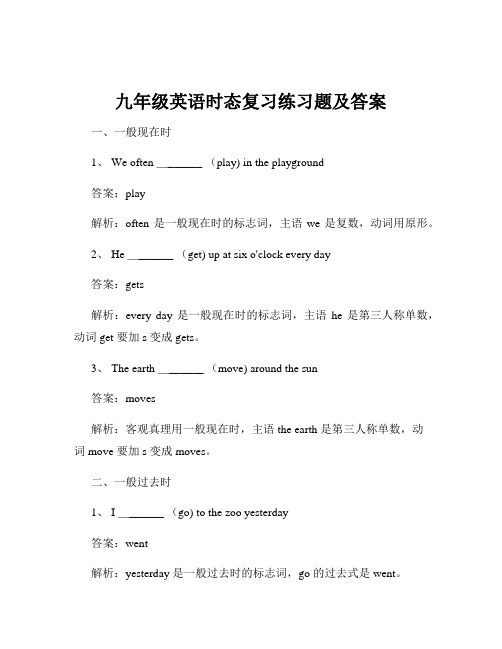
九年级英语时态复习练习题及答案一、一般现在时1、 We often _______ (play) in the playground答案:play解析:often 是一般现在时的标志词,主语 we 是复数,动词用原形。
2、 He _______ (get) up at six o'clock every day答案:gets解析:every day 是一般现在时的标志词,主语he 是第三人称单数,动词 get 要加 s 变成 gets。
3、 The earth _______ (move) around the sun答案:moves解析:客观真理用一般现在时,主语 the earth 是第三人称单数,动词 move 要加 s 变成 moves。
二、一般过去时1、 I _______ (go) to the zoo yesterday答案:went解析:yesterday 是一般过去时的标志词,go 的过去式是 went。
2、 She _______ (be) happy last week答案:was解析:last week 是一般过去时的标志词,主语 she 是第三人称单数,be 动词用 was。
3、 They _______ (not do) their homework last night答案:didn't do解析:last night 是一般过去时的标志词,否定句要用助动词didn't,后面接动词原形 do。
三、一般将来时1、 We _______ (have) a party next week答案:will have / are going to have解析:next week 是一般将来时的标志词,可以用 will +动词原形或者 be going to +动词原形的结构。
2、 He _______ (come) back tomorrow答案:will come / is going to come解析:tomorrow 是一般将来时的标志词,同理可用 will +动词原形或者 be going to +动词原形。
(完整版)初中英语时态综合练习,附答案
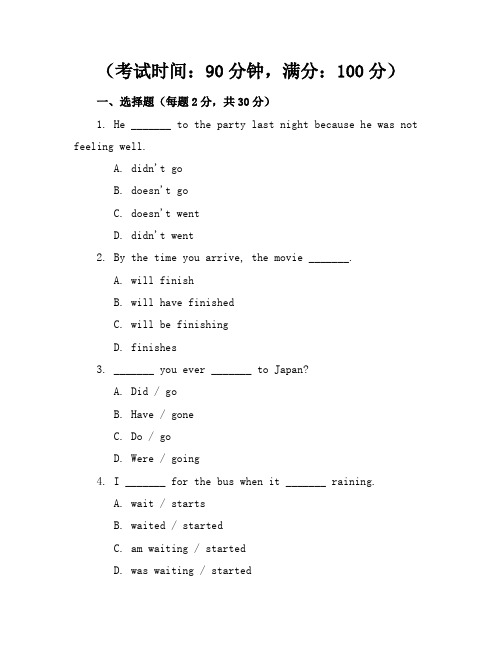
(考试时间:90分钟,满分:100分)一、选择题(每题2分,共30分)1. He _______ to the party last night because he was not feeling well.A. didn't goB. doesn't goC. doesn't wentD. didn't went2. By the time you arrive, the movie _______.A. will finishB. will have finishedC. will be finishingD. finishes3. _______ you ever _______ to Japan?A. Did / goB. Have / goneC. Do / goD. Were / going4. I _______ for the bus when it _______ raining.A. wait / startsB. waited / startedC. am waiting / startedD. was waiting / started5. _______ you like some more coffee?A. CouldB. WouldC. ShouldD. Might6. She _______ her homework when her friend _______.A. was doing / calledB. did / has calledC. does / callsD. is doing / calls7. _______ you _______ the book yet?A. Did / readB. Have / readC. Do / readD. Are / reading8. They _______ in the park when it _______.A. play / is rainingB. played / rainedC. are playing / rainsD. were playing / started to rain9. I _______ her for two years before we got married.A. knowB. knewC. have knownD. had known10. _______ you like _______ to the concert with me?A. Do / to goB. Would / goingC. Are / goingD. Will / go二、判断题(每题1分,共20分)1. The past perfect tense is used to describe an action that happened before another past action. (True/False)2. The simple present tense can be used to talk about scheduled future events. (True/False)3. The present perfect continuous tense is used to describe an action that started in the past and is still continuing in the present. (True/False)4. The past continuous tense is used to describe an action that was happening at a specific time in the past. (True/False)6. The simple past tense is used to describe an action that happened and is now finished. (True/False)7. The present continuous tense is used to describe an action that is happening now. (True/False)8. The past perfect continuous tense is used to describe an action that was ongoing before another past action. (True/False)9. The future simple tense is used to talk about spontaneous future decisions. (True/False)10. The present perfect tense is used to describe an action that happened at an unspecified time before now. (True/False)三、填空题(每空1分,共10分)1. I _______ (to eat) dinner when the phone _______ (to ring).2. By next week, she _______ (to finish) her project.3. They _______ (to travel) to London last summer.4. _______ you _______ (to see) the new movie yet?5. He _______ (to study) English for five years.四、简答题(每题10分,共10分)1. Explain the difference between the simple past and the past continuous tense.2. When do we use the present perfect tense?五、综合题(1和2两题7分,3和4两题8分,共30分)1. Read the following conversation and fill in the blanks with the correct form of the verb in brackets.A: _______ you _______ (to see) Tom recently?B: Yes, I _______ (to see) him last week. He _______ (to tell) me about his new job.2. Complete the following sentences using the correct form of the verb in brackets.1. I _______ (to go) to the gym after work.2. She _______ (to have) a meeting at 10 am tomorrow.3. They _______ (to travel) to Paris next month.3. Write a short paragraph (about 5070 words) using at least three different tenses. Topic: "My Typical Day"4. Read the passage and answer the questions.Yesterday, Sarah and her8. 改错题(每题2分,共10分)1. I has finished my homework.2. She didn't went to the party.3. He was watching TV when I called him.4. They have arrived at the airport.5. I didn't saw him yesterday.9. 完形填空题(每题2分,共10分)Once upon a time, there was a little girl named Snow White. She lived in a beautiful castle with her stepmother, the evil queen. The queen was very jealous of Snow White's beauty, so she (1) _______ (to hire) a huntsman to kill her. However, when the huntsman saw Snow White, he couldn't bring himself to harm her. Instead, he (2) _______ (to warn) her and let her escape into the forest.In the forest, Snow White (3) _______ (to find) a small cottage. She (4) _______ (to be) tired and hungry, so she (5)_______ (to go) inside and (6) _______ (to eat) some food. After that, she (7) _______ (to fall) asleep.Meanwhile, the queen (8) _______ (to use) her magicmirror to find out where Snow White (9) _______ (to be). When she (10) _______ (to discover) that Snow White was still alive, she (11) _______ (to make) a poisoned apple that would put Snow White into a deep sleep.The queen (12) _______ (to disguise) herself as an old woman and (13) _______ (to go) to the cottage where Snow White (14) _______ (to live). She (15) _______ (to convince) Snow White to bite the poisoned apple, and soon Snow White (16) _______ (to fall) into a deep sleep.Fortunately, a prince (17) _______ (to pass) the cottage and (18) _______ (to see) Snow White. He (19) _______ (to kiss) her, and she (20) _______ (to wake) up. They (21)_______ (to get) married and (22) _______ (to live) happily ever after.10. 阅读理解题(每题3分,共15分)Read the following passage and answer the questions.Questions:1. What is the Eiffel Tower?2. Where is the Eiffel Tower located?3. Who designed the Eiffel Tower?4. How tall is the Eiffel Tower?5. Why is the Eiffel Tower famous?11. 写作题(每题10分,共10分)Write a short essay (about 100120 words) on the topic "My Favorite Holiday". Include reasons why it is your favorite holiday and describe how you usually celebrate it.12. 翻译题(每题5分,共10分)1. They have been studying English for five years.2. I didn't understand the question, so I asked the teacher for help.13. 听力题(每题2分,共10分)Listen to the recording and answer the questions.1. What did the man do yesterday?2. Where will they go for their vacation?3. Why did she miss the meeting?4. When will the train arrive?5. How long has he been working here?14. 语法填空题(每题2分,共10分)Fill in the blanks with the correct form of the verb in brackets.1. If I (to have) enough money, I (to buy) a new car.2. By the time you arrive, the movie (to finish).3. They (to watch) TV when the phone (to ring).4. He (to be) tired because he (to work) all day.5. I (to meet) her two years ago.15. 口语表达题(每题5分,共10分)1. Describe your favorite book and explain why you like it.2. Talk about a memorable experience you had while traveling.。
初中英语八大时态全套精讲及练习题(附答案)
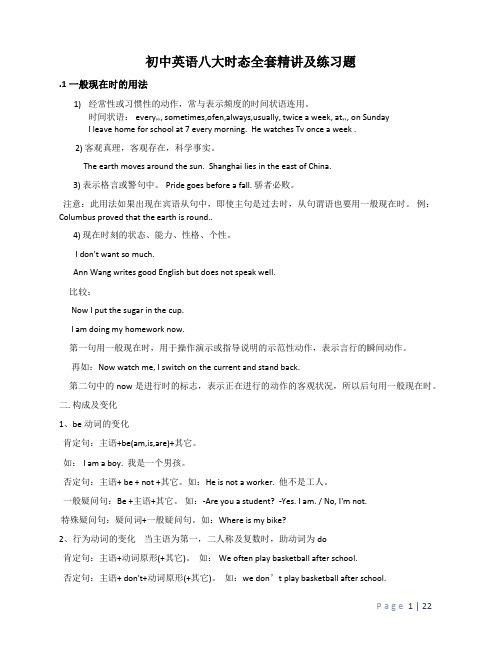
初中英语八大时态全套精讲及练习题.1 一般现在时的用法1)经常性或习惯性的动作,常与表示频度的时间状语连用。
时间状语: every…, sometimes,ofen,always,usually, twice a week, at…, on SundayI leave home for school at 7 every morning. He watches Tv once a week .2) 客观真理,客观存在,科学事实。
The earth moves around the sun. Shanghai lies in the east of China.3) 表示格言或警句中。
Pride goes before a fall. 骄者必败。
注意:此用法如果出现在宾语从句中,即使主句是过去时,从句谓语也要用一般现在时。
例:Columbus proved that the earth is round..4) 现在时刻的状态、能力、性格、个性。
I don't want so much.Ann Wang writes good English but does not speak well.比较:Now I put the sugar in the cup.I am doing my homework now.第一句用一般现在时,用于操作演示或指导说明的示范性动作,表示言行的瞬间动作。
再如:Now watch me, I switch on the current and stand back.第二句中的now是进行时的标志,表示正在进行的动作的客观状况,所以后句用一般现在时。
二. 构成及变化1、be动词的变化肯定句:主语+be(am,is,are)+其它。
如: I am a boy. 我是一个男孩。
否定句:主语+ be + not +其它。
如:He is not a worker. 他不是工人。
初中英语时态综合复习讲练(含答案)
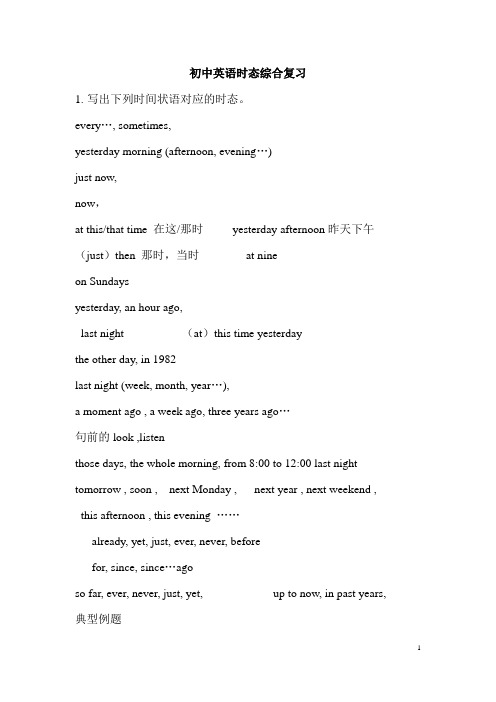
初中英语时态综合复习1.写出下列时间状语对应的时态。
every…, sometimes,yesterday morning (afternoon, evening…)just now,now,at this/that time 在这/那时yesterday afternoon昨天下午(just)then 那时,当时at nineon Sundaysyesterday, an hour ago,last night (at)this time yesterdaythe other day, in 1982last night (week, month, year…),a moment ago , a week ago, three years ago…句前的look ,listenthose days, the whole morning, from 8:00 to 12:00 last night tomorrow , soon ,next Monday , next year , next weekend , this afternoon , this evening ……already, yet, just, ever, never, beforefor, since, since…agoso far, ever, never, just, yet,up to now, in past years, 典型例题(1) ---Do you know our town at all?---No, this is the first time I ___ here.A. wasB. have beenC. cameD. am coming(1)He said he________me a present unless I_______ in doing the experiment.A. had not given; had not succeededB. would not give; succeedC. will not give; succeedD. would not give; will succeed. this morning, the whole morning, all day yesterday, from nine to ten last evening, when, whileMary ___ a dress when she cut her finger.A. madeB. is makingC. was makingD. makesAs she ___ the newspaper, Granny ___ asleep.A.read;was fallingB. was reading;fellC. was reading;was fallingD. read;fell---- Your phone number again? I ___ quite catch it.---- It's 69568442.A. didn'tB. couldn'tC. don'tD. can't巩固练习:(聪明的你一定能全部做对)1.2.3.4.5.(see)you at four yesterday afternoon?6., her son ____________ (play) outside the room.7.It ________ (begin) to we _____________(work) in the field.8.(go) out. {go out 意为熄灭}9.——------Oh, I ____________ (read) some books on science.10. Girls ___________(dance) boys ____________(sing) at the party.11.--- Did you see Tim just now?--- Yes. He __________ (fish) by the river.the teacher ______ (come) into the classroom, the students __________(laugh)loudly.写出下列时间状语对应的时态。
初三英语时态综合复习与运用练习题40题(带答案)
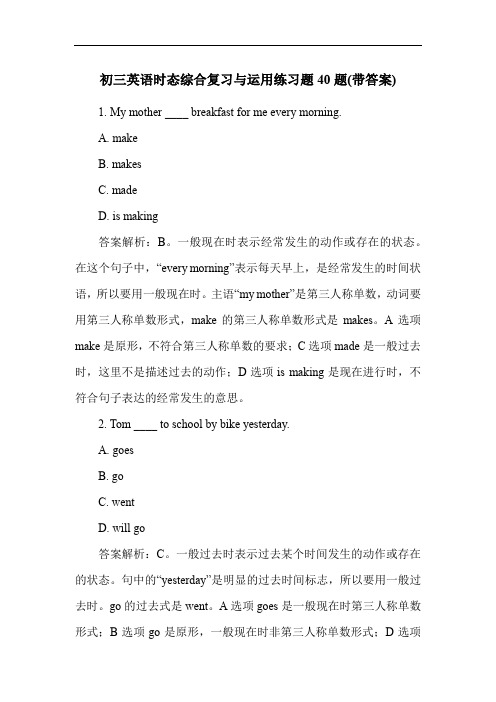
初三英语时态综合复习与运用练习题40题(带答案)1. My mother ____ breakfast for me every morning.A. makeB. makesC. madeD. is making答案解析:B。
一般现在时表示经常发生的动作或存在的状态。
在这个句子中,“every morning”表示每天早上,是经常发生的时间状语,所以要用一般现在时。
主语“my mother”是第三人称单数,动词要用第三人称单数形式,make的第三人称单数形式是makes。
A选项make是原形,不符合第三人称单数的要求;C选项made是一般过去时,这里不是描述过去的动作;D选项is making是现在进行时,不符合句子表达的经常发生的意思。
2. Tom ____ to school by bike yesterday.A. goesB. goC. wentD. will go答案解析:C。
一般过去时表示过去某个时间发生的动作或存在的状态。
句中的“yesterday”是明显的过去时间标志,所以要用一般过去时。
go的过去式是went。
A选项goes是一般现在时第三人称单数形式;B选项go是原形,一般现在时非第三人称单数形式;D选项will go是一般将来时,表示将来要发生的动作,均不符合题意。
3. We often ____ our homework in the evening.A. doB. doesC. didD. are doing答案解析:A。
一般现在时用于表示经常、习惯性的动作。
“often”表示经常,是一般现在时的标志词。
主语“we”是复数,动词用原形。
B选项does是一般现在时第三人称单数形式;C选项did是一般过去时;D选项are doing是现在进行时,都不符合句子语境。
4. She ____ a book last night.A. readsB. readC. is readingD. has read答案解析:B。
初三英语时态综合练习题40题(带答案)

初三英语时态综合练习题40题(带答案)1.She often ______ her homework after dinner.A.doB.doesC.doingD.did答案解析:B。
本题考查一般现在时,主语是she,第三人称单数,谓语动词要用does。
A 选项do 是原形,主语不是第一人称、第二人称或复数时不能用;C 选项doing 是现在分词,不能单独作谓语;D 选项did 是一般过去时,与题干中的often 不符。
2.He ______ to school by bike yesterday.A.goB.goesC.wentD.going答案解析:C。
本题考查一般过去时,yesterday 是明显的过去时间标志,谓语动词要用过去式went。
A 选项go 是原形;B 选项goes 是一般现在时第三人称单数形式;D 选项going 是现在分词,不能单独作谓语。
3.They ______ play football on Sundays.A.oftenB.oftensC.sometimesD.never答案解析:A。
本题考查一般现在时的频率副词用法。
B 选项oftens 拼写错误;C 选项sometimes 和D 选项never 也可以,但题干强调“经常”,often 更符合语境。
4.I ______ at home yesterday evening.A.amB.isC.wasD.were答案解析:C。
本题考查一般过去时,主语是I,be 动词要用was。
A 选项am 是一般现在时;B 选项is 也是一般现在时且主语是第三人称单数;D 选项were 主语是复数时用。
5.She ______ English very well.A.speakB.speaksC.spokeD.speaking答案解析:B。
本题考查一般现在时,主语是she,第三人称单数,谓语动词要用speaks。
A 选项speak 是原形;C 选项spoke 是一般过去时;D 选项speaking 是现在分词,不能单独作谓语。
初中英语时态语态复习及专题训练100题(附答案)
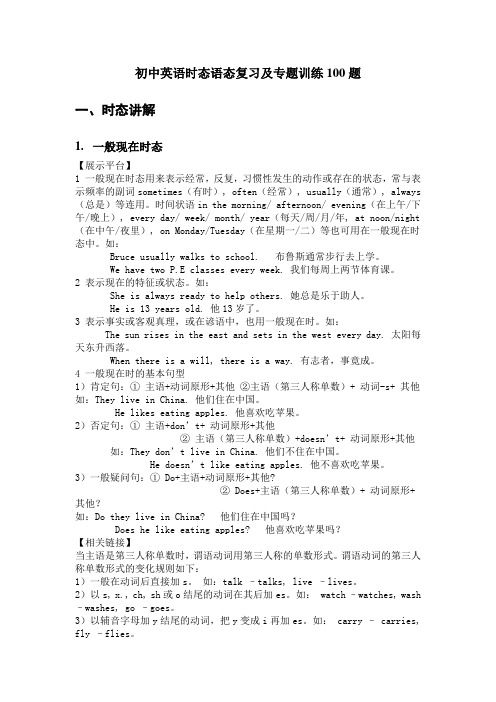
初中英语时态语态复习及专题训练100题一、时态讲解1.一般现在时态【展示平台】1 一般现在时态用来表示经常,反复,习惯性发生的动作或存在的状态,常与表示频率的副词sometimes(有时), often(经常), usually(通常), always (总是)等连用。
时间状语in the morning/ afternoon/ evening(在上午/下午/晚上), every day/ week/ month/ year(每天/周/月/年, at noon/night (在中午/夜里), on Monday/Tuesday(在星期一/二)等也可用在一般现在时态中。
如:Bruce usually walks to school. 布鲁斯通常步行去上学。
We have two P.E classes every week. 我们每周上两节体育课。
2 表示现在的特征或状态。
如:She is always ready to help others. 她总是乐于助人。
He is 13 years old. 他13岁了。
3 表示事实或客观真理,或在谚语中,也用一般现在时。
如:The sun rises in the east and sets in the west every day. 太阳每天东升西落。
When there is a will, there is a way. 有志者,事竟成。
4 一般现在时的基本句型1)肯定句:① 主语+动词原形+其他②主语(第三人称单数)+ 动词-s+ 其他如:They live in China. 他们住在中国。
He likes eating apples. 他喜欢吃苹果。
2)否定句:① 主语+do n’t+ 动词原形+其他② 主语(第三人称单数)+doesn’t+ 动词原形+其他如:They don’t live in China. 他们不住在中国。
He doesn’t like eating apples. 他不喜欢吃苹果。
初中英语综合时态训练(含详细答案)
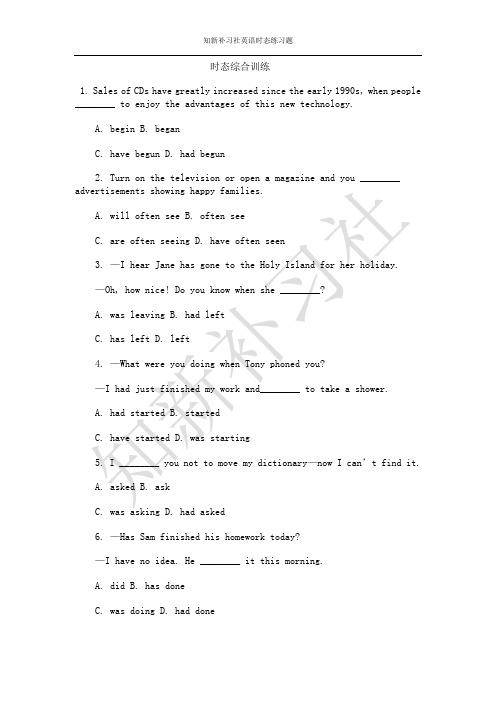
时态综合训练1. Sales of CDs have greatly increased since the early 1990s, when people ________ to enjoy the advantages of this new technology.A. beginB. beganC. have begunD. had begun2. Turn on the television or open a magazine and you ________ advertisements showing happy families.A. will often seeB. often seeC. are often seeingD. have often seen3. —I hear Jane has gone to the Holy Island for her holiday.—Oh, how nice! Do you know when she ________?A. was leavingB. had leftC. has leftD. left4. —What were you doing when Tony phoned you?—I had just finished my work and________ to take a shower.A. had startedB. startedC. have startedD. was starting5. I ________ you not to move my dictionary—now I can’t find it.A. askedB. askC. was askingD. had asked6. —Has Sam finished his homework today?—I have no idea. He ________ it this morning.A. didB. has doneC. was doingD. had done7. —What’s that terrible noise?—The neighbors ________ for a party.A. have preparedB. are preparingC. prepareD. will prepare8. Now that she is out of a job, Lucy ________ going back to school, but she hasn’t decided yet.A. had consideredB. has been consideringC. consideredD. is going to consider9. The teacher, with 6 girls and 8 boys of her class, ________ visitinga museum when the earthquake struck.A. wasB. wereC. had beenD. would be10. The discussion ________ alive when an interesting topic was brought in.A. was comingB. had comeC. has comeD. came11. Because the shop ________ , all the T-shirts are sold at half price.A. has closed downB. closed downC. is closing downD. had closed down12. Let’s keep to the point or we ________ any decisions.A. will never reachB. have never reachedC. never reachD. never reached13. My mind wasn’t on what he was saying so I’m afraid I ________ half of it.A. was missingB. had missedC. will missD. missed14. It is said in the book that Thomas Edison (1847—1931) ________ the world-leading inventor for sixty years.A. would beB. has beenC. had beenD. was15. —You were out when I dropped in at your house.—Oh, I ________ for a friend from England at the airport.A. was waitingB. had waitedC. am waitingD. has waited1. B. when引导的是一个非限制性定语从句,when指20世纪90年代初,当然用一般过去时。
初中时态专项练习(含答案)

初中时态专项练习(含答案)1.My XXX last year。
She has been a member of the Youth League for about a year now.2.XXX.3.Mr Zhao doesn't like swimming。
does he?4.I'll talk to him when he comes.5.They were having supper when we went into the room.6.We'll go climbing if XXX.7.I don't know if it will XXX.8.Nathan Hale said he would give his life for his country.9.XXX.10.Father put on his cap and went out.20.Xu Ping has only been to Japan once.21.XXX.22.Have you ever been to Nanjing?23.He said he had done something wrong before.24.Thomas Edison had already built a chemistry lab for himself by the time he was ten.25.At the age of eleven。
XXX.26.One day while I was walking along the street。
I XXX.27.XXX I XXX.29.Do you know where your sister has gone?30.XXX.30.Mike usually gets up at six in the morning.31.The sun gives us light and heat.32.At that time。
初中八种英语时态精讲精练(含答案)

初中八种英语时态精讲精练(含答案)初中八种英语时态精讲精练现在时态一、用法1.表示频繁的行动、行为或存在状态。
常用的时间状语有:often,usually,always,everyday/week/month/year,sometimes,seldom,onceaweek,twiceaweek,onsundays等。
igotoschooleveryday.2.表示主语的身份或特征。
hisfatherisadoctor.tomistall.3.表达客观事实或普遍真理。
地球是圆的。
太阳比月亮大。
4.在条件状态从句和时间状语从句中,使用一般现在时来表示将来。
ifyoudon’tgosoon,you’llbelate.如果你不快去的话,你就要迟到了。
二、构成在现在时,除了单数第三人称主语外,谓语动词总是使用原形。
如果主语是单数第三人称,谓语动词的结尾应该改变(加-s或-es)。
1.添加-srun→ 跟随动词的原始形式2.以ch,sh,s,o,x结尾的动词后加-esguesses,fixes,teaches,washes,goes3.以辅音字母+y结尾的动词,先将y变为i,再加-estry→tries4.以元音字母+y结尾的动词后加-sstay→stays5.have-has三、一般现在时的句型变化。
1.肯定句(1)主语+主语+谓语他们都是高个子学生。
他来自日本。
Amisare用法公式:我用是,你用是,是连接他、她和它;用法表示单数,复数。
(2) A.主语+实词动词+其他动词b.单三人称主语+实义动词单三人称+其它heusuallygoestoschoolbybike.2.否定句(1)主语+AM/is/are+not+谓语sheisnotanurse(2)a.主语+don’t+动词原形+其它如:idon’tplaysoccerafterschool.b、一个三人主语+不+动词原型+其他他放学后不去公园。
一般问题(1)am/is/are+主语+表语?isyourmotherateacher?(2)a.do+主语+动词原形+其它?doyouspeakenglish?b、是否+单一三人主语+动词原型+其他人?你的兄弟会说话吗?4.特殊疑问句特殊疑问词+一般疑问句?你妈妈每天都做什么?特殊练习一、写出下列动词的第三人称单数形式1.学习2。
初三英语时态综合复习与运用练习题40题含答案解析
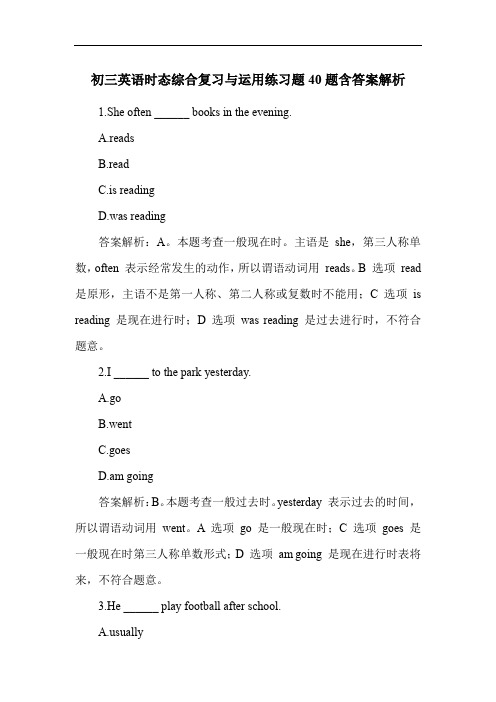
初三英语时态综合复习与运用练习题40题含答案解析1.She often ______ books in the evening.A.readsB.readC.is readingD.was reading答案解析:A。
本题考查一般现在时。
主语是she,第三人称单数,often 表示经常发生的动作,所以谓语动词用reads。
B 选项read 是原形,主语不是第一人称、第二人称或复数时不能用;C 选项is reading 是现在进行时;D 选项was reading 是过去进行时,不符合题意。
2.I ______ to the park yesterday.A.goB.wentC.goesD.am going答案解析:B。
本题考查一般过去时。
yesterday 表示过去的时间,所以谓语动词用went。
A 选项go 是一般现在时;C 选项goes 是一般现在时第三人称单数形式;D 选项am going 是现在进行时表将来,不符合题意。
3.He ______ play football after school.uallyualC.is usuallyually is答案解析:A。
本题考查一般现在时。
usually 是副词,修饰动词play,B 选项usual 是形容词不能修饰动词;C 选项is usually 和D 选项usually is 语序错误且不符合题意。
4.They ______ a good time last weekend.A.haveB.hadC.hasD.is having答案解析:B。
本题考查一般过去时。
last weekend 表示过去的时间,所以谓语动词用had。
A 选项have 是一般现在时;C 选项has 是一般现在时第三人称单数形式;D 选项is having 是现在进行时,不符合题意。
5.My mother ______ cooking every day.A.likeB.likesC.likingD.is liking答案解析:B。
中考英语时态综合练习题50题含答案解析

中考英语时态综合练习题50题含答案解析1.She often ________ books in the library.A.readB.readsC.is readingD.will read答案解析:B。
一般现在时表示经常发生的动作或存在的状态。
标志词有often、usually、always 等。
主语she 是第三人称单数,谓语动词要用reads。
A 选项read 是动词原形,主语是第三人称单数时不能用;C 选项is reading 是现在进行时;D 选项will read 是一般将来时。
2.We ________ English classes every day.A.haveB.hasC.are havingD.will have答案解析:A。
every day 是一般现在时的标志词。
主语we 是第一人称复数,谓语动词用have。
B 选项has 用于第三人称单数;C 选项are having 是现在进行时;D 选项will have 是一般将来时。
3.My father ________ to work by car.A.goB.goesC.is goingD.will go答案解析:B。
标志词无,但从句子意思可判断是经常发生的动作,用一般现在时。
主语my father 是第三人称单数,谓语动词用goes。
A 选项go 是动词原形;C 选项is going 是现在进行时;D 选项will go 是一般将来时。
4.The sun ________ in the east.A.riseB.risesC.is risingD.will rise答案解析:B。
客观真理用一般现在时。
主语the sun 是第三人称单数,谓语动词用rises。
A 选项rise 是动词原形;C 选项is rising 是现在进行时;D 选项will rise 是一般将来时。
5.They ________ basketball after school.A.playB.playsC.are playingD.will play答案解析:A。
中考英语复习时态专练含答案课件

18. The bike is nice . How much_d_o_e_s__it_cos___t__? (cost)19. The boy is happy because he _h_a_s_s_o_ld___ (sell) out all the newspapers.20 .The plan h__a_s_bee___ _g_i_v n__(give) up because of rain.21 .If it doesn’______t_r_a_in__ (not rain) tomorrow, we w__ill___g_o_ (go )fishing.22 .Where h__a_v_e__you_been______(be) these days?23 .Where is Tom? He has____ o_n_e__ (go) to the post office. He said he w__o_ul__d_com____e___(come) back soon.
九年级英语时态综合练习题50题(带答案)
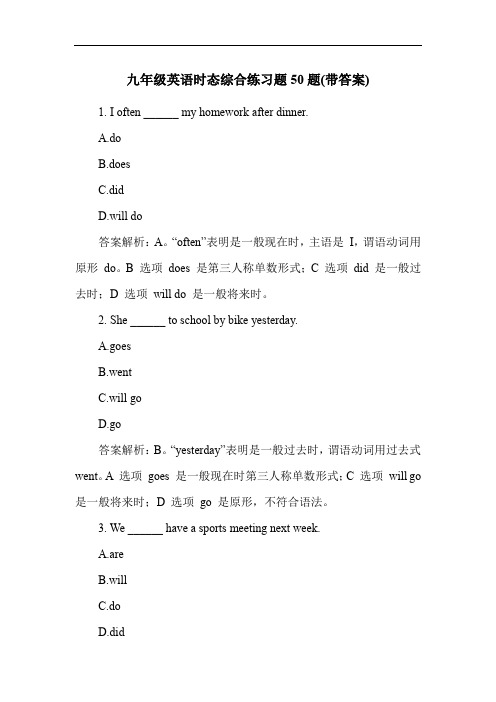
九年级英语时态综合练习题50题(带答案)1. I often ______ my homework after dinner.A.doB.doesC.didD.will do答案解析:A。
“often”表明是一般现在时,主语是I,谓语动词用原形do。
B 选项does 是第三人称单数形式;C 选项did 是一般过去时;D 选项will do 是一般将来时。
2. She ______ to school by bike yesterday.A.goesB.wentC.will goD.go答案解析:B。
“yesterday”表明是一般过去时,谓语动词用过去式went。
A 选项goes 是一般现在时第三人称单数形式;C 选项will go 是一般将来时;D 选项go 是原形,不符合语法。
3. We ______ have a sports meeting next week.A.areB.willC.doD.did答案解析:B。
“next week”表明是一般将来时,用will+动词原形。
A 选项are 后面不能直接跟动词原形have;C 选项do 用于一般现在时;D 选项did 用于一般过去时。
4. My father ______ in the factory every day.A.workB.worksC.workedD.will work答案解析:B。
“every day”表明是一般现在时,主语是第三人称单数father,谓语动词用works。
A 选项work 是原形;C 选项worked 是一般过去时;D 选项will work 是一般将来时。
5. They ______ football last Sunday.A.playB.playedC.will playD.plays答案解析:B。
“last Sunday”表明是一般过去时,谓语动词用过去式played。
A 选项play 是一般现在时原形;C 选项will play 是一般将来时;D 选项plays 是一般现在时第三人称单数形式。
(完整版)人教版初中英语时态综合练习及答案
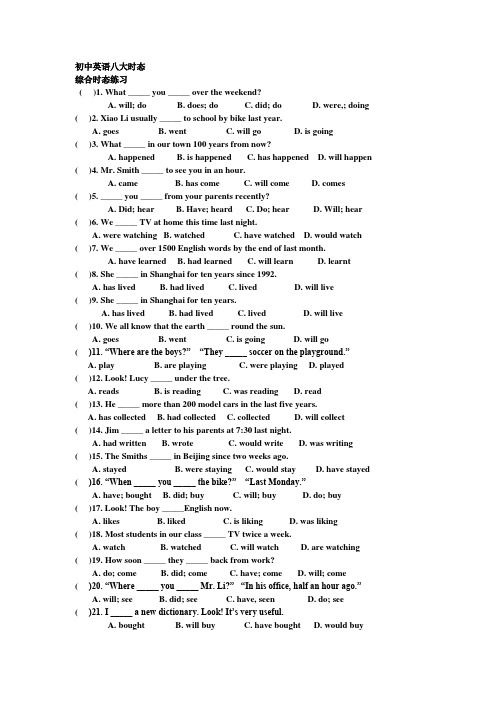
初中英语八大时态综合时态练习( )1. What _____ you _____ over the weekend?A. will; doB. does; doC. did; doD. were,; doing ( )2. Xiao Li usually _____ to school by bike last year.A. goesB. wentC. will goD. is going( )3. What _____ in our town 100 years from now?A. happenedB. is happenedC. has happenedD. will happen ( )4. Mr. Smith _____ to see you in an hour.A. cameB. has comeC. will comeD. comes( )5. _____ you _____ from your parents recently?A. Did; hearB. Have; heardC. Do; hearD. Will; hear ( )6. We _____ TV at home this time last night.A. were watchingB. watchedC. have watchedD. would watch ( )7. We _____ over 1500 English words by the end of last month.A. have learnedB. had learnedC. will learnD. learnt( )8. She _____ in Shanghai for ten years since 1992.A. has livedB. had livedC. livedD. will live( )9. She _____ in Shanghai for ten years.A. has livedB. had livedC. livedD. will live( )10. We all know that the earth _____ round the sun.A. goesB. wentC. is goingD. will go( )11. “Where are the boys?”“They _____ soccer on the playground.”A. playB. are playingC. were playingD. played( )12. Look! Lucy _____ under the tree.A. readsB. is readingC. was readingD. read( )13. He _____ more than 200 model cars in the last five years.A. has collectedB. had collectedC. collectedD. will collect( )14. Jim _____ a letter to his parents at 7:30 last night.A. had writtenB. wroteC. would writeD. was writing ( )15. The Smiths _____ in Beijing since two weeks ago.A. stayedB. were stayingC. would stayD. have stayed ( )16. “When _____ you _____ the bike?”“Last Monday.”A. have; boughtB. did; buyC. will; buyD. do; buy( )17. Look! The boy _____English now.A. likesB. likedC. is likingD. was liking( )18. Most students in our class _____ TV twice a week.A. watchB. watchedC. will watchD. are watching ( )19. How soon _____ they _____ back from work?A. do; comeB. did; comeC. have; comeD. will; come( )20. “Where _____ you _____ Mr. Li?”“In his office, half an hour ago.”A. will; seeB. did; seeC. have, seenD. do; see( )21. I _____ a new dictionary. Look! It’s very useful.A. boughtB. will buyC. have boughtD. would buy( )22. I won’t watch the movie tonight. I _____ it before.A. will seeB. have seenC. sawD. had seen( )23. Hello! I _____ know you _____ in Chengdu. How long have you been here?A. didn’t; wereB. don’t areC. didn’t; areD. don’t; were( )24. He _____ a fire and then cooked a meal.A. had madeB. was makingC. madeD. has made( )25. If I _____ time tomorrow, I will go to visit my grandfather.A. haveB. will haveC. would haveD. am having( )26. I’m going to be a doctor wh en I _____ up.A. growB. will growC. grewD. am growing( )27. The film _____ on for five minutes when I got to the cinema.A. has beenB. had beenC. wasD. is( )28. She _____ dinner when her son came in.A. has cookedB. had cookedC. was cookingD. would cook( )29. The train _____ when we got to the station. We had to wait for the next one.A. has leftB. had leftC. leftD. was leaving( )30. He said that he _____ to the barber’s tomorrow morning.A. will goB. wentC. is goingD. would go( )31. In the last years I _____ a lot of friends.A. have madeB. madeC. will makeD. was making ( )32. The boys _____ for about two hours.A. are playing soccerB. have been playing soccerC. were playingD. play soccer( )33. He _____ so quickly that he could win the race.A. is runningB. will runC. ranD. had run( )34. He didn’t go there with us because he _____ there before.A. has beenB. had beenC. wentD. would go( )35. I don’t know if he ______ tomorrow. If he _____, I will tell you.A. will come; will comeB. comes; comesC. will come; comesD. comes; will come( )36. When I was young, my mother told me that the sun _____ in the east.A. riseB. risesC. roseD. had risen( )37. “_____ you _____ your work?” “Yes. I finished it an hour ago.”A. Did; finishB. Have; finishedC. Will; finishD. Had; finished ( )38. Hurry up, or you _____ the early bus.A. will missB. has missedC. would missD. missed( )39. I _____ Mr. Green while I _____ along the street last Sunday.A. met; walkedB. was meeting; walkedC. met; was walkingD. was meeting; was walking( )40. Tom is strong and he _____ to school every day.A. walkedB. walksC. will walkD. has walked ( )41. He said that he _____ with Mr. Black at that time.A. talkedB. was talkingC. is talkingD. would talk ( )42. We _____ English in this school since we came here.A. have studiedB. studiedC. had studiedD. were studying ( )43. She _____ at home until her mother came back.A. has stayedB. stayedC. had stayedD. will stay( )44. There will be an interesting movie _____ two days.A. forB. inC. afterD. since( )45. She _____ there until I came back.A. didn’t leaveB. has stayedC. leftD. was staying( )46. It has been raining _____ two hours ago.A. untilB. forC. sinceD. by( )47. His father _____ since he was two years old.A. has diedB. diedC. has deathD. has been dead ( )48. The meeting _____ for ten minutes when I got there yesterday.A. has begunB. had begunC. has been onD. had been on ( )49. He had collected over 500 stamps _____ he was twelve years old.A. sinceB. forC. untilD. by the time( )50. I was doing my homework _____ she rang me up last night.A. whenB. whileC. sinceD. before( )51. “Where is John?” “He _____ the library.”A. has been toB. has gone toC. has been inD. has been at( )52. How long _____ you _____ the computer?A. have; boughtB. did; buyC. have ; hadD. will; buy( )53. She _____ Shanghai for two days.A. leftB. has leftC. will leaveD. has been away from ( )54. He didn’t tell me anything about it _____ he left.A. sinceB. untilC. by the timeD. while( )55. She _____ China since she was five years old.A. has come toB. has arrived atC. has arrived inD. has been in( )56. I had finished my homework _____ I watched TV last night.A. beforeB. afterC. whenD. until( )57. Miss White has been _____ the music club for 4 years.A. joiningB. joinC. joinedD. in( )58. What do you think he will _____ ten years?A. be forB. be atC. be toD. be in( )59. There _____ two football games in our school next week.A. is going to beB. will haveC. will beD. is going to have ( )60. They _____ a birthday party next Friday afternoon.A. is going to beB. will beC. will haveD. is going to have ( )61. How long have you ____ the pen?A. keptB. boughtC. borrowedD. got( )62. I _____ Mr. Brown since I left Shanghai in 2004.A. have seenB. sawC. h aven’t seenD. didn’t see( )63. You don’t have to describe her. I _____ her several times.A. had metB. have metC. metD. meet( )64. I _____ a cold for five days. I still can’t get rid of it.A. caughtB. hadC. have caughtD. have had( )65. What _____ you _____ at nine o’clock that morning?A. are; doingB. did; doC. were; doingD. had; done( )66. What _____ you _____ by nine o’clock that morning?A. are; doingB. did; doC. were; doingD. had; done( )67. The sign _____, “No Parking!”A. readsB. was readC. is readingD. read( )68. “_____ you _____ your lunch?” “Yes. I _____ it at school.”A. Did; have; have hadB. Have; had; hadC. Did; have; hadD. Have; had; have( )69. Lily _____ for her mother until she _____ home.A. will wait; will comeB. won’t wait; comesC. will wait; comesD. waits; will come( )70. “Mr. Brown is leaving for a trip.” “Really? Where _____ he _____?”A. has; goneB. will; goC. did; goD. does; go( )71. Tom, you _____ the book for two weeks. You have to return it now.A. borrowedB. have borrowedC. keptD. have kept( )72. “Have you mended your shoes?” “Yes. I _____ it twenty minutes ago.”A. have mendedB. mendedC. had mendedD. will mend( )73. Mr. Smith _____ to China last year and _____ in love with her.A. goes; fallsB. went; fellC. went; feltD. has gone; fell ( )74. If you don’t go to the meeting tomorrow, _____.A. he will, tooB. he won’t, eitherC. he does, tooD. he doesn’t, either ( )75. “Shall we go watching the match?” “Sorry, I can’t. I _____ my homework.”A. doB. have doneC. am doingD. did( )76. The children won’t go hiking if it _____ next Sunday.A. rainB. rainsC. will rainD. is raining( )77. “_____ you _____ to Japan?” “Yes. I will go there next month.”A. Have; beenB. Have; goneC. Are; goingD. Did; go( )78. When I got there, the film _____ for five minutes.A. had been onB. had begunC. was beginningD. began( )79. Don’t ope n the door until the bus _____.A. will stopB. doesn’t stopC. is stoppingD. stops( )80. “_____ you _____ to Japan?” “Yes. We went there last year.”A. Have; beenB. Have; goneC. Did; goD. Are; going参考答案:1-5 CBDCB 6-10 ABBAA 11-15 BBADD 16-20 BAADB 21-25 CBACA 26-30 ABCBD 31-35 ABCBC 36-40 BBACB 41-45 BABBA 46-50 CDDDA 51-55 BCDBD 56-60 ADDCC 61-65 ACBDC 66-70 DABCB 71-75 BBBBC 76-80 BCADA。
- 1、下载文档前请自行甄别文档内容的完整性,平台不提供额外的编辑、内容补充、找答案等附加服务。
- 2、"仅部分预览"的文档,不可在线预览部分如存在完整性等问题,可反馈申请退款(可完整预览的文档不适用该条件!)。
- 3、如文档侵犯您的权益,请联系客服反馈,我们会尽快为您处理(人工客服工作时间:9:00-18:30)。
初中英语时态综合复习1.写出下列时间状语对应的时态。
every…, sometimes,yesterday morning (afternoon, evening…)just now,now,at this/that time 在这/那时yesterday afternoon昨天下午(just)then 那时,当时at nineon Sundaysyesterday, an hour ago,last night (at)this time yesterdaythe other day, in 1982last night (week, month, year…),a moment ago , a week ago, three years ago…句前的look ,listenthose days, the whole morning, from 8:00 to 12:00 last night tomorrow , soon ,next Monday , next year , next weekend , this afternoon , this evening ……already, yet, just, ever, never, beforefor, since, since…agoso far, ever, never, just, yet,up to now, in past years, 典型例题(1) ---Do you know our town at all?---No, this is the first time I ___ here.A. wasB. have beenC. cameD. am coming(1)He said he________me a present unless I_______ in doing the experiment.A. had not given; had not succeededB. would not give; succeedC. will not give; succeedD. would not give; will succeed. this morning, the whole morning, all day yesterday, from nine to ten last evening, when, whileMary ___ a dress when she cut her finger.A. madeB. is makingC. was makingD. makesAs she ___ the newspaper, Granny ___ asleep.A.read;was fallingB. was reading;fellC. was reading;was fallingD. read;fell---- Your phone number again? I ___ quite catch it.---- It's 69568442.A. didn'tB. couldn'tC. don'tD. can't巩固练习:(聪明的你一定能全部做对)1.2.3.4.5.(see)you at four yesterday afternoon?6., her son ____________ (play) outside the room.7.It ________ (begin) to we _____________(work) in the field.8.(go) out. {go out 意为熄灭}9.——------Oh, I ____________ (read) some books on science.10. Girls ___________(dance) boys ____________(sing) at the party.11.--- Did you see Tim just now?--- Yes. He __________ (fish) by the river.the teacher ______ (come) into the classroom, the students __________(laugh)loudly.写出下列时间状语对应的时态。
every …, sometimes,at …, on Sunday,yesterday, last week, an hour ago, the other day, in 1982,just nownext…, tomorrow, in+时间,for, since, so far, ever, never, just, yet, till/until, up to now, in past years, always, recently动词时态巩固练习50题( )1. There _______ no hospitals in my hometown fifty years ago. A. is B. are C. was D. were( )2. --- Who sings best in your class? --- Jenny _______.A. doB. didC. doesD. has done( )3. --- _____ the young girl _____ the old man clean his room every day? --- Yes, she does.A. Does; helpB. Has; helpedC. Did; helpD. Do; helps( )4. --- Can I go to Beijing for my holiday, Dad? --- You can when you _______ a bit older.A. will getB. getC. are gettingD. got( )5. --- What does Linda often do in the evening?--- She often _______ her homework, but on the evening of March 12 she _______ TV.A.does; watchesB. is doing; watchedC. does; watchedD. is doing; was watching( )6. Our geography teacher told us yesterday that the earth _______ around the sun.A. was movingB. movedC. has movedD. moves( )7. If he _______harder, he will catch up with us soon.A. studyB. studiesC. will studyD. studied( )8. --- Don’t forget to ask him to write to me.--- I won’t. As soon as he _______, I’ll ask him to write t o you.A. will comeB. cameC. comesD. is coming( )9. --- Do you like this silk dress?--- Yes, I do. It _______ so soft and comfortable.A. is feelingB. feelsC. has feltD. is felt( )10. Oh, it’s you. I’m sorry I _______ know you _______ here. A. don’t; are B. didn’t; are C. didn’t; were D. don’t; were( )11. Mr Lu Xun died in 1936. He _______ a lot of famous novels.A. wroteB. was writingC. has writtenD. would write ( )12. --- Your telephone number again? I _______ quite catch it. --- It’s 2567321.A. can’tB. couldn’tC. don’tD. didn’t( )13. --- How was your weekend on the farm?--- Great! We _______ with the farmers.A. enjoy ourselvesB. went fishingC. will workD. make friends ( )14. --- What did Mr Jones do before he moved here?--- He _______ a city bus for over twenty-five years.A. is drivingB. droveC. has drivenD. drives( )15. Jane _______ a new dress every month when she was in Shanghai.A. buysB. is buyingC. boughtD. will buy( )16. --- Liu Mei can’t come tonight.--- Why? But she _______ me she would come.A. tellsB. toldC. is toldD. had told( )17. He turned off the light and then _______.A. leavesB. has leftC. will leaveD. left( )18. --- Keep quiet, please. They _______ a meeting. --- Sorry. A. have B. had C. are having D. have had( )19. --- Jimmy is leaving for a holiday. --- Really? Where _______ he _______?A. has; goneB. will; goC. did; goD. would; go( )20. Frank _______ to see his grandma if he _______ free tomorrow.A.will come; will beB. comes; isC. will come; isD. comes; will be( )21. There _______ a talk on science in our school next Monday. A. will give B. will be C. is going to give D. is( )22. --- Shall we go shopping now?--- Sorry, I can’t. I _______ my shirts.A. washB. washesC. washedD. am washing( )23. Hurry up! We’re all waiting for you. I _______ for an important phone call. Go without me.A. waitB. was waitingC. am waitingD. waited( )24. --- Did you see Tom at the party? --- No, he _______ by the time I got there.A. had leftB. was leavingC. leftD. has left( )25. --- Is this raincoat yours? --- No, mine _______ there behind the door.A. has hungB. is hangingC. hungD. will hang( )26. --- _______ you _______ TV at the moment? --- No, you can turn it off.A. Did; watchB. Are; watchingC. Do; watchD. Have; watched ( )27. I don’t think Jim saw me; he _______ a book at that moment.A. just readB. has just readC. was just readingD. had just read ( )28. Mr Smith _______a book about China last year but I don’t know whether he has finished it.A. has writtenB. wroteC. had writtenD. was writing( )29. --- I called you at seven yesterday evening, but there was no answer.--- Oh, I am sorry. I _______ dinner at my friend’s home.A. am havingB. hadC. was havingD. have had( )30. --- Do you know Miss Wang?--- Yes. I first met her two years ago. She _______ at a radio shop at that time.A. was workingB. has workedC. is workingD. had worked ( )31. Mr White _______ the newspaper, while his daughter _______TV.A.read; was watchingB. was reading; watchedC. was reading; was watchingD. read; watched( )32. --- I _______ you at the meeting. Why? --- I was ill.A. sawB. have seenC. not seeD. didn’t see( )33. When the teacher came in, the students _______ about the new film.A. are talkingB. were talkingC. talkedD. talks( )34. The 2004 Athens Olympic Games _______ on August 13.A. has begunB. lastedC. beganD. has lasted( )35. Hurry up! The play _______ for ten minutes.A. has been onB. has begunC. had begunD. began( )36. --- May I speak to Mr Smith? --- Sorry, he _______ Australia. But he _______ in two days.A. has been to; will come backB. has gone to; will be backC. has been in; would come backD. is leaving for; doesn’t come back ( )37. I can’t go to see the film tonight, because I ______ my ticket. A. have lost B. lost C. will lose D. was losing( )38. --- What do you think of the film Harry Potter? --- It is very nice. I _______ it twice.A. will seeB. have seenC. sawD. see( )39. We _______to learn English five years ago. We _______ it for five years up to now.A.began; learnedB. begin; have learnedC. have begun; had learnedD. began; have learned( )40. --- What a nice bike! How long _______ you _______ it?--- Just two weeks.A. have; boughtB. did; buyC. have; hadD. are; having( )41. You don’t have to describe her. I _______ her several times. A. had met B. have met C. met D. meet( )42. --- I’m sorry to hav e kept you waiting.--- Oh, not at all. I _______ here only a few minutes.A. have comeB. had beenC. wasD. have been( )43. --- _______ my dictionary anywhere?--- Yes. I saw it on your desk a moment ago.A. Have you seenB. Do you seeC. Had you seenD. Would you see( )44. --- I haven’t heard from Li Jun for a long time.--- What do you think _______ to him?A. was happeningB. to happenC. has happenedD. had happened( )45. --- Do you know our town at all?--- No, this is the first time I _______ here.A. wasB. have beenC. cameD. am coming( )46. We were all surprised when he made it clear that he _______ office soon.A. leavesB. would leaveC. will leaveD. had left( )47. --- How long _______ your father _______ the Party? --- For more than twenty years.A. has; joinedB. did; joinC. has; been inD. does; join( )48. Mrs Smith _______ her keys in the office so she had to wait until her husband _______ home.A.has left; comesB. left; had comeC. had left; would comeD. had left; came( )49. Do you know Betty very well? Yes, she and I _____ friends since we met in Guangzhou last summer.A. have madeB. have becomeC. have beenD. have turned ( )50. What did your son say in the letter? He told me that he ____ the Disney World the next day.A. would visitB. has visitC. is going to visitD. will visit初中英语时态综合复习讲练(包含答案)Key:1-5 DCABC 6-10 DBCBC 11-15 ADBBC 16-20 BDCBC21-25 BDCAB 26-30 BCDCA 31-35 CDBCA 36-40 BABDC 41-45 BDACB 46-50 BCDCA11 / 11。
